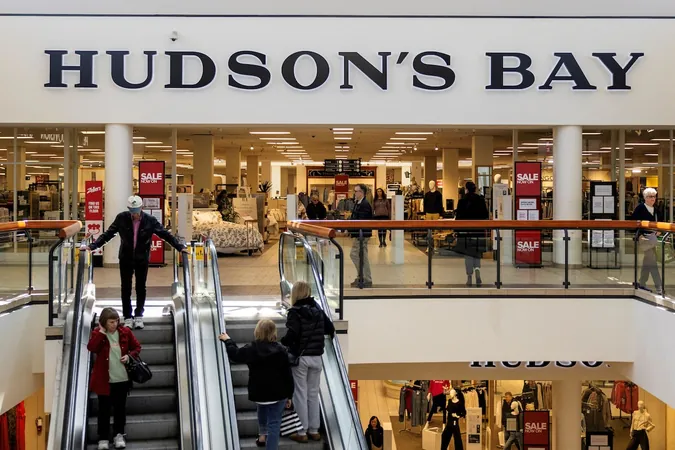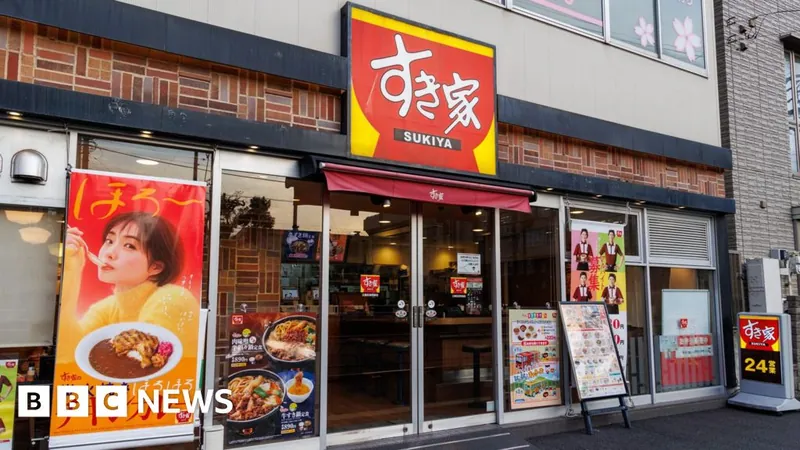
Why You Won’t See Discounts on Chanel Perfume Amid Hudson’s Bay Liquidation: What You Need to Know
2025-03-31
Author: Olivia
Introduction
As Hudson's Bay embarks on a massive liquidation sale, customers might be disheartened to encounter a glaring absence of discounts on luxury beauty products, particularly at the Chanel counter. On the first day of the sale, a shopper at Toronto's CF Fairview Mall asked if upscale perfumes or high-end lipsticks would see any price cuts. The response was clear and resolute: "Never."
Luxury Brands Remain at Full Price
Across the beauty department, while clearance signs adorned many areas of the store, luxury brands like Chanel, Dior, and Guerlain remained firmly at full price, with many counters entirely unmanned. A recent press release from Hudson's Bay confirmed this situation, stating explicitly, “While all merchandise is being sold, closing discounts do not apply to beauty, stripes, and select luxury brands.”
The Strategy of Luxury Brands
This trend among high-end brands is not an isolated incident. According to retail industry experts, luxury companies are notorious for protecting their brand image and preserving their ability to sell at premium prices. Selling items at a discount, especially during a liquidation event, can tarnish this image. Jane Hali, CEO of Florida's Jane Hali & Associates, noted that luxury brands are often quick to distance themselves from liquidating department stores.
“Luxury brands are pulling out of these situations,” Hali remarked, pointing out that similar actions were taken during the liquidation of Barney’s New York in 2019. “They can command better prices on their own platforms,” she added, emphasizing that the need to preserve their reputation outweighs the benefits of discounting during a clearance sale.
Negotiations and Bankruptcy Clauses
Interestingly, luxury brands often negotiate specific clauses when establishing partnerships with department stores, expressly forbidding their participation in store-wide discounts or liquidations. However, in instances where retailers enter bankruptcy or seek creditor protection, such agreements can become tenuous. In Hudson’s Bay's case, they owe millions to luxury names such as Chanel, Hugo Boss, LVMH, and others.
Financial Implications for Hudson's Bay
As of March 7, the retailer faced a staggering debt to high-end brands, including $5.6 million to Chanel Canada and amounts owed to designers like Tom Ford and Gianni Versace. Industry analyst Alex Hennick speculated that these brands would likely want to reclaim their products to avoid association with discounted prices.
The Future of Hudson’s Bay
Hudson’s Bay is grappling with a challenging future as it works on a plan amidst a widespread closure of stores. The retailer has sought protection from creditors under Canada’s Companies’ Creditors Arrangement Act (CCAA) and has received court approval to liquidate all but six of its department stores across the country.
The Role of Vendors
While many brands that operate on consignment can reclaim their goods, wholesale vendors, who sell their products outright, face different challenges. They may even pursue options to buy back their inventory rather than allowing it to be slashed priced. Brian Ehrig, a partner in the consumer practice with consultancy firm Kearney, remarked that top-tier luxury brands usually find success in selling over 90% of their offerings at full price, indicating they would rather not see their items enter a discount environment at all.
Conclusion
The fate of Hudson’s Bay remains uncertain, but one thing is clear: the relationship between luxury brands and department stores is evolving. Many high-end companies are increasingly limiting their distribution in favor of direct sales through their own shops and online channels, indicating a significant shift in the retail landscape. Customers seeking bargains on luxury products might find themselves disappointed, as the retail world adapts to a new reality where exclusivity reigns supreme.









 Brasil (PT)
Brasil (PT)
 Canada (EN)
Canada (EN)
 Chile (ES)
Chile (ES)
 Česko (CS)
Česko (CS)
 대한민국 (KO)
대한민국 (KO)
 España (ES)
España (ES)
 France (FR)
France (FR)
 Hong Kong (EN)
Hong Kong (EN)
 Italia (IT)
Italia (IT)
 日本 (JA)
日本 (JA)
 Magyarország (HU)
Magyarország (HU)
 Norge (NO)
Norge (NO)
 Polska (PL)
Polska (PL)
 Schweiz (DE)
Schweiz (DE)
 Singapore (EN)
Singapore (EN)
 Sverige (SV)
Sverige (SV)
 Suomi (FI)
Suomi (FI)
 Türkiye (TR)
Türkiye (TR)
 الإمارات العربية المتحدة (AR)
الإمارات العربية المتحدة (AR)